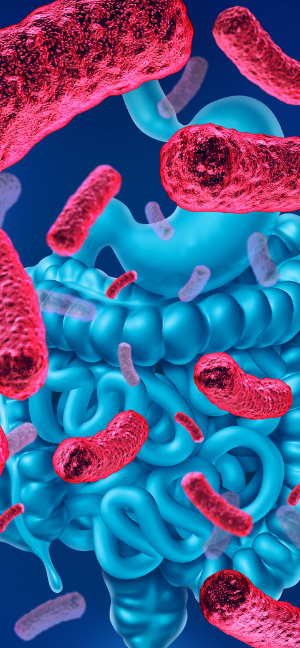Could SIBO be the Root Cause of your Patient’s IBS?

FxMed Tech Support
SIBO (Small Intestinal Bacterial Overgrowth)
SIBO is defined as an increase in the number of bacteria, and/or changes in the types of bacteria present in the small intestine. In most patients, SIBO is not caused by a single type of bacteria, but is an overgrowth of the various types of bacteria that should normally be found in the colon. Less commonly, SIBO results from an increase in the otherwise normal bacteria of the small intestine.Common Symptoms of SIBO
- Postprandial bloating & abdominal distension with associated discomfort
- Gas and belching
- Constipation (generally associated with methanogenic bacteria)
- Diarrhoea (generally associated with hydrogenic bacteria)
- Altered gut motility – can switch between constipation and diarrhoea
- Immune activation (e.g. food sensitivities)
- Fatigue
- Brain fog
- Somatic pain
- Nutrient deficiencies i.e. vitamin B12 & Iron
- Weight loss / Weight gain

PREVALENCE
Estimates are based on prevalence of Irritable Bowel Syndrome (IBS). This is 11- 14% of the population globally and 17% in New Zealand. It is the most common gastrointestinal diagnosis in primary care although it is thought that up to 50% of people with symptoms of IBS do not consult their GP. Studies also show that over 50% of patients diagnosed with IBS actually have SIBO.
SIBO has been shown to negatively affect both the structure and function of the small intestine. It may significantly interfere with digestion of food and absorption of nutrients, primarily by damaging the cells lining the small intestine (the mucosa). Additionally, this damage to the small intestine mucosa can lead to impaired gut permeability (leaky gut) which is known to have a number of potential complications including immune reactions that cause food allergies or sensitivities, generalized inflammation, and autoimmune diseases.
These pathogenic bacteria, whether too many or the wrong types, can lead to nutritional deficiencies on top of those due to poor digestion or absorption. In particular, the bacteria will take up certain B vitamins, such as vitamin B12, before our own cells have a chance to absorb these important nutrients. They may also consume some of the amino acids, or protein, that we’ve ingested, which can lead to both mild protein deficiency and an increase in ammonia production by certain bacteria. (We normally produce some ammonia daily from normal metabolism, but ammonia requires detoxification, so this may add to an already burdened detoxification system.) The bacteria may also decrease fat absorption through their effect on bile acids, leading to deficiencies in fat soluble vitamins like A and D.
The body has several different ways of preventing SIBO. These include adequate levels of gastric acid, pancreatic enzymes and bile secretion, healthy flora distribution, waves of bowel wall muscular activity, immunoglobulins in the intestinal fluid, and the ileocecal valve that normally allows the flow of contents into the large intestine but prevents them from refluxing back into the small intestine.
RISK FACTORS FOR THE DEVELOPMENT OF SIBO
The cause of SIBO is usually complex, and likely affects more than one of the protective mechanisms listed above. A number of risk factors for SIBO have been identified including structural disorders of the small intestine or large intestine, IBS, motility disorders or factors that interfere with motility (eg medications (opiates and antibiotics), surgery, fasting, over-eating, digestive enzyme deficiency, hypo-thyroid conditions, Diabetes, being elderly, stress, Infectious Gastroenteritis, Clostridium, Giardia, Lyme Disease & Scleroderma.
GUT MOTILITY
Though there are many identified associations between SIBO and other diseases as described above, abnormalities in gut motility are recognized as one of the most common associations. One study published demonstrated that patients with SIBO do have significant delays in small bowel transit time. This finding suggests that patients with SIBO, who do not recover after a standard course of antibiotics, or botanical antimicrobial protocol may benefit from the addition of a prokinetic agent which increases the muscular contractions of the small bowel.
Gut motility is responsible for moving the contents of the gut forward. The peristaltic waves (migrating motor complex) are responsible for clearing out undigested food particles and microbes out of the stomach and small intestine. Failure of these waves may contribute towards SIBO. It is also thought that a weak Ileocecal valve may contribute towards SIBO by allowing reverse entry of microbes from the cecum into the ileum. Weakness of the Ileocecal valve may be due to straining during evacuation.
The final products of carbohydrate fermentation in the Ileum and colon appear to be hydrogen and methane and it is thought that this pathway drives the other microbial fermentation pathways. An overgrowth of methane producing archae microbes in the colon (they consume hydrogen produced by other commensal microbes) are thought to contribute towards chronic or functional constipation by impacting on gut motility via the neurotransmitter serotonin. Modulating the population of these microbes or inhibiting the process of methanogenesis may help to normalise gut motility. There is a belief that some people are methane producers (usually there is a sulphurous smell in their flatus) and others are either non producers or hydrogen producers (usually no smell is associated with hydrogen producing bacteria). It is suggested it is not as clear cut as that, but perhaps some people produce less methane due to the composition of the microflora in the Gut.
In the normal gut, easily digestible starch undergoes complete digestion and absorption within the proximal small intestine and is not available for fermentation in the distal ileum and colon where bacterial colonization is the greatest.
In contrast, gas production results from bacterial fermentation of poorly digestible starch that is not assimilated by the proximal gut. In small intestinal bacterial overgrowth, the concentration of bacterial flora increases proximally allowing fermentation of both easily digestible and poorly digestible starches.
Share:
Related Posts

Benefits of Creatine in Perimenopause and Menopause
Written by Maura MacDonald, MS, RD, CSSD | 2025 As we age, the notion is that we will inevitably become weaker. Not as mobile as

Goodbye Pie Chart, Hello Phase 1 Sliders
Written by Allison Smith, ND | 2025 As we usher in a new era of DUTCH testing which leaves behind the concept of the three-way

Introducing the DUTCH Dozen
Written by Kelly Ruef, ND | 2025 Hormone testing can be complex, which is why Precision Analytical developed the DUTCH Dozen, an interpretive framework that

DUTCH Report Enhancements
Written by Hilary Miller, ND | 2025 Precision Analytical have released the newest version of the DUTCH Test. This is the report’s most significant update

Gallbladder Health 101: What It Does and How to Keep It Working Well
Written by Ashley Palmer & Pooja Mahtani | 2025 The gallbladder may not get much attention compared to the gut, but it plays a central
